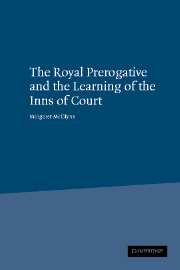Book contents
- Frontmatter
- Contents
- Preface
- List of figures
- List of abbreviations
- Introduction
- 1 The early readings
- 2 Expansion and debate
- 3 Frowyk and Constable on primer seisin
- 4 Spelman, Yorke, and the campaign against uses
- 5 The Edwardian readers and beyond
- Conclusion
- Notes on the appendixes
- Appendix 1 Thomas Frowyk's reading on Prerogativa Regis
- Appendix 2 John Spelman's reading on Prerogativa Regis
- Bibliography
- Index
Appendix 1 - Thomas Frowyk's reading on Prerogativa Regis
Published online by Cambridge University Press: 04 July 2009
- Frontmatter
- Contents
- Preface
- List of figures
- List of abbreviations
- Introduction
- 1 The early readings
- 2 Expansion and debate
- 3 Frowyk and Constable on primer seisin
- 4 Spelman, Yorke, and the campaign against uses
- 5 The Edwardian readers and beyond
- Conclusion
- Notes on the appendixes
- Appendix 1 Thomas Frowyk's reading on Prerogativa Regis
- Appendix 2 John Spelman's reading on Prerogativa Regis
- Bibliography
- Index
Summary
[f.1] Dominus rex habebit custodiam [The lord king shall have the wardship] etc. Before now there have been several opinions about whether this is a statute or not, or a declaration of the prerogative of the king by the authority of parliament; Prysott said on this in 35 Hen. VI that it is a statute and there is the same opinion in 43 Edw. III in the case of the prior of Lanthony, but afterwards in 15 Edw. IV the contrary is held, that is that it is not a statute but rather a declaration of the king's prerogatives. I think that this is not any statute nor declaration as above, but a treatise made by some men wise in the law, just like Bracton, Visus Franciplegii, Modus Calumniandi Essoniorum, Hengham, and other similar works. And if it were a statute, it would be entirely observed in every point; and many articles of this are not held to be law and many were law before the making of it. In this it is like the statute of 25 Edw. III of treason, for that is only an exposition of the common law; also it is not like Magna Carta for that was made a statute by Marlborough, c.4. Further, if it was a statute that would appear in the wording of it, such as “in the parliament held at” etc. or similar words. These are prerogatives which are given at the common law, as I understand.
- Type
- Chapter
- Information
- The Royal Prerogative and the Learning of the Inns of Court , pp. 261 - 294Publisher: Cambridge University PressPrint publication year: 2003



